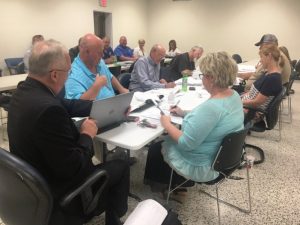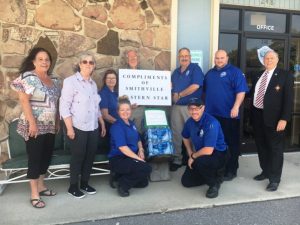News
County Bracing for Possible Property Tax Hike
May 22, 2019
By: Dwayne Page
The county needs more revenue to operate over the next year and a property tax increase may be coming.
Except for action on the road department budget and a property tax rate recommendation for the 2019-20 fiscal year, the county budget committee has completed its work in preparing a spending plan for the county commission to consider this summer.
Although the budget committee has proposed some line item transfers and cuts along with new revenue from fee increases compared to the current year, new spending has also been added to the new budget
During Wednesday night’s meeting, the county’s financial advisor Steve Bates updated the committee on the county’s projected financial condition over the next year. In the general fund, the county is operating under a budget of $9,215,870 this year. That is projected to increase in the 2019-20 budget year by $608,361 to $9,830,231.
Without a tax hike, Bates said the county general fund is expected to be in the red by $1,681,933 as of June 30, 2020 if spending goes according to the proposed budget. To balance the budget, the county would have to pull the $1.6 million from the fund balance (cash reserves)
In order to keep the county from digging into its fund balance (cash reserves) to operate and to meet the state required local Basic Education Program (BEP) match for schools, Bates said an overall property tax hike of 36 cents is needed (32 cents more for county general and 4 cents more for schools). The property tax rate is currently $1.83 per $100 of assessed value. If increased by 36 cents, the rate would go to $2.19 per $100 of assessed value.
Bates also offered the committee another option, increasing the overall tax rate by 29 cents (25 cents more for the general fund and an additional 4 cents for schools) which would put the tax rate at $2.12 per $100 of assessed value. Even under that option, the county general fund is projected to run in the red by $473,132 as of June 30, 2020 if all budgeted funding is spent.
According to Bates, the county could get by on an overall 29 cent tax increase for a few years but it would have to keep a close watch on spending.
The budget committee has not yet signaled what it will recommend to the county commission on a proposed tax rate for 2019-20 but is expected to weigh all options and make a decision at the next meeting on Wednesday, May 29.
In the meantime, Bates plans to put down on paper three tax rate proposals for the committee to consider.
Order of the Eastern Star Makes Donation of Water to Local Emergency Service Agencies (VIEW VIDEO HERE)
May 22, 2019
By: Dwayne Page
“Together We Build A Better Life”
In keeping with that motto Smithville Chapter #374 leaders of the Order of the Eastern Star showed their appreciation to local first responders and emergency personnel Wednesday by donating three cases of bottled water to six different departments.
Worthy Matron Pat Wilt, Worthy Patron Dr. Jerry Paul Vanatta, Organist Gay Vanatta, and Chaplain and Chairman of the Health Committee Dr. Robert R. Atnip personally brought the donations and thanked the agencies for their service to the community including the Smithville Police and Fire Departments, DeKalb County Sheriff’s Department, DeKalb 911 Center, DeKalb EMS, and the Smithville-DeKalb County Rescue Squad.
The Order of the Eastern Star is the largest fraternal organization in the world to which both men and women of all faiths may belong. Only men who are Masons are eligible and only women with specific Masonic affiliation may be members. Eastern Star is a social order comprised of persons with deep religious convictions and spiritual values reflecting the spirit of fraternal love and the desire to work together for good. It gives them the opportunity to give a part of their time to many projects that benefit mankind.
(PICTURED: #1 Smithville Chapter #374 leaders of the Order of the Eastern Star showed their appreciation to the Smithville Police Department Wednesday by donating three cases of bottled water. Pictured: Police Chief Mark Collins, Eastern Star Chaplain Dr. Robert R. Atnip, Police Sergeant Lance Dillard, Eastern Star Worthy Matron Pat Wilt, Police Captain Steven Leffew, Eastern Star Worthy Patron Dr. Jerry Paul Vanatta, Police Officer Brandon Donnell, and Eastern Star Organist Gay Vanatta)
(PICTURED: #2 Smithville Chapter #374 leaders of the Order of the Eastern Star showed their appreciation to the Smithville Volunteer Fire Department Wednesday by donating three cases of bottled water. Pictured: Eastern Star Organist Gay Vanatta, Worthy Patron Dr. Jerry Paul Vanatta, Eastern Star Worthy Matron Pat Wilt, and Eastern Star Chaplain Dr. Robert R. Atnip)
(PICTURED: #3 Smithville Chapter #374 leaders of the Order of the Eastern Star showed their appreciation to the DeKalb County Sheriff’s Department Wednesday by donating three cases of bottled water. Pictured: Eastern Star Organist Gay Vanatta, Worthy Patron Dr. Jerry Paul Vanatta, Eastern Star Worthy Matron Pat Wilt, and Eastern Star Chaplain Dr. Robert R. Atnip with members of the Sheriff’s Department/Jail Staff)
(PICTURED: #4 Smithville Chapter #374 leaders of the Order of the Eastern Star showed their appreciation to the DeKalb County Emergency Communications District (Central Dispatch/911 Center) Wednesday by donating three cases of bottled water. Pictured: Eastern Star Organist Gay Vanatta, 911 Dispatcher Chrystal Reed, Eastern Star Worthy Matron Pat Wilt, Worthy Patron Dr. Jerry Paul Vanatta, 911 Dispatchers Sasha Avera and Shelly Mulford, and Eastern Star Chaplain Dr. Robert R. Atnip)
(PICTURED: #5 Smithville Chapter #374 leaders of the Order of the Eastern Star showed their appreciation to the DeKalb EMS/Ambulance Service Wednesday by donating three cases of bottled water. Pictured: Eastern Star Organist Gay Vanatta, Eastern Star Worthy Matron Pat Wilt, EMS-AEMT Misty Green, EMS- EMT-B Michelle Haggard (kneeling), Worthy Patron Dr. Jerry Paul Vanatta, EMS Director Hoyte Hale, EMS- EMT PCC Kenny Moffitt (kneeling), EMS-EMT-P Tim Briggs, and Eastern Star Chaplain Dr. Robert R. Atnip)
(PICTURED: #6 Smithville Chapter #374 leaders of the Order of the Eastern Star showed their appreciation to the Smithville-DeKalb County Rescue Squad Wednesday by donating three cases of bottled water. Pictured: Eastern Star Organist Gay Vanatta, Eastern Star Worthy Matron Pat Wilt, Worthy Patron Dr. Jerry Paul Vanatta, Harlan McCloud, Joe Johnson, Robert Sartin, Rescue Squad Captain Dustin Johnson, Luke Judkins, Larry Maddux, and Eastern Star Chaplain Dr. Robert R. Atnip)
“Brizo” is a Great Gal Waiting on the Perfect Home (VIEW VIDEO HERE)
May 22, 2019
By: Dwayne Page
A great gal waiting on the perfect home
That’s what Megan Moore, Director of the DeKalb Animal Shelter has to say about “Brizo”, the WJLE/DeKalb Animal Coalition featured “Pet of the Week”.
Brizo is an 8 year old spayed female English Bulldog.
“She gets along with male dogs and cats, but not other female dogs. She is up to date on all of her vaccines, is potty trained, and knows basic commands. Come out and see her today,” said Moore.
For more information call 615-597-1363.
The shelter, located at 186 Transfer Station Road behind Tenneco Automotive, is open Thursday and Friday from noon until 4 p.m. and Saturday from 10 a.m. until noon.
« First ‹ Previous 1 1800 1890 1898 1899 19001901 1902 1910 2000 2504 Next › Last »

















